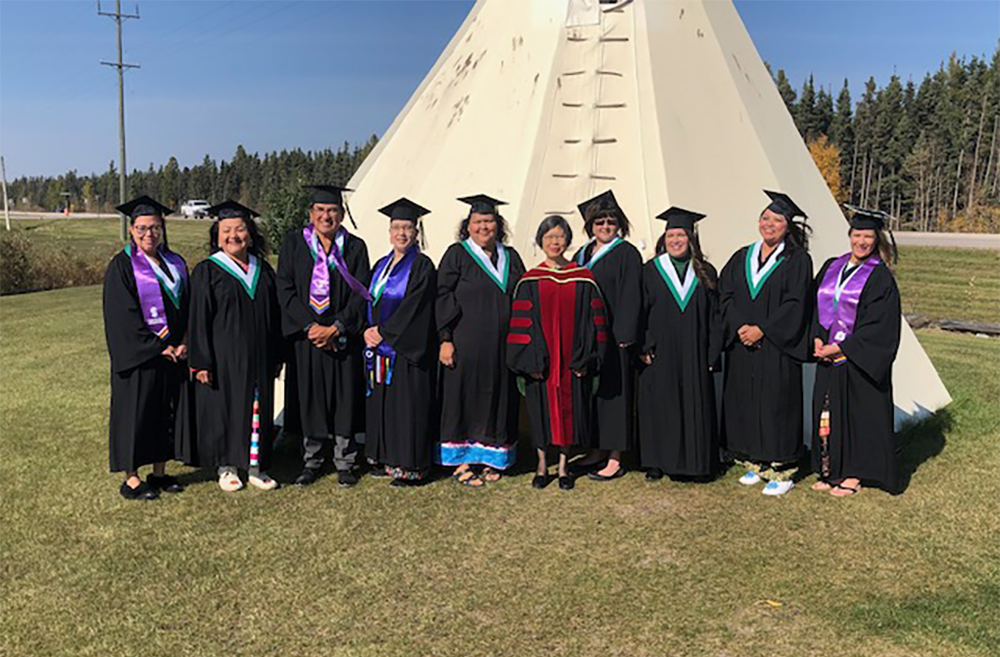
Dr. Maria Cheung, Associate Dean, with Bachelor of Social Work cohort graduates
Congratulations to the Bachelor of Social Work cohort graduates
Congratulations to the graduates of the Cree Nation Child and Family Caring Agency / Opaskwayak Cree Nation Child and Family Services’ Bachelor of Social Work cohort.
In 2020, two Indigenous agencies reached out to the Faculty of Social Work to propose a cohort that would bring the BSW degree into the community of Opaskwayak First Nation. Partnering with Opaskwayak Cree Nation Child and Family Services and Cree Nation Child and Family Caring Agency, the Faculty of Social Work was able to do just that.
Our Distance Delivery program offers a cohort program as a way for students located in rural or remote communities to have an opportunity to earn a Bachelor of Social Work degree while remaining in their home community.
The cohort officially started the program in January 2021 with the intention of in-person learning in the community of Opaskwayak Cree Nation. However, due to the pandemic restrictions, students were challenged with new technologies and new methods of learning, all while working full-time and caring for their families. This Fall, 10 cohort students graduated with their BSW degree.
Meet some of our graduates:
Valerie Whyte, BSW
Cohort Valedictorian
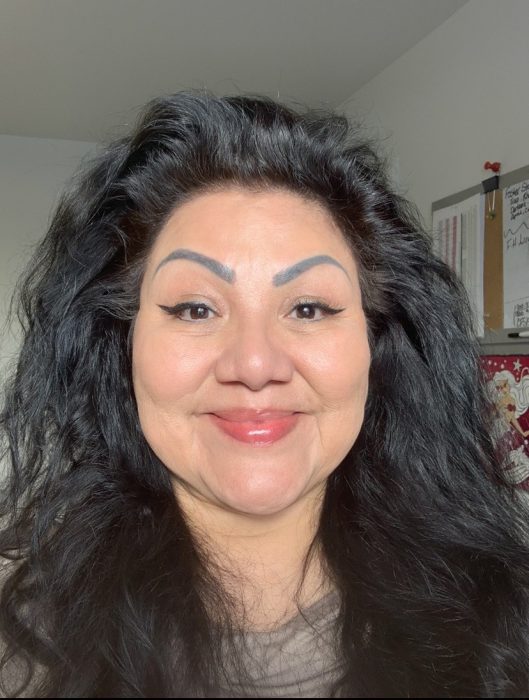 Why did you choose this program?
Why did you choose this program?
“I belong to a remote, isolated First Nation community in northern Manitoba that is unique, distinct, and filled with ancestral epistemological belief systems. My homeland and territories embody kinship, relationships, protection, language, culture, shelter, nurturing, love, giving our family a keen sense of belonging. Choosing the BSW program in my present location was the best, smartest and valuable decision I ever made for important reasons. The program involved no uprooting, moving or relocation expenses, or the need to participate in a reintegration program for adjusting to city life. Additionally, I did not have to take a leave of absence from work equating to payroll losses, wages and benefits costing years of investing, training, and professional development. The BSW program is well organized, considerate, mindful, trauma-informed, holistic, balanced, culturally appropriate, intelligent, sensitive for remote learning. The cohort program keeps you close to home while offering tremendous partnerships, supports, instructors, resources, tools, material, unlimited library access, tutoring, financial supports giving you the added edge to a successful post-secondary education. Northern Forest Nation people will never have to leave home for the sake of achieving a post-secondary degree program of their choosing,” says Valerie.
How was your experience in the program?
“After completing the application process with helpful and professional staff I set myself up for success. I organized a home study complete with a desk, laptop, comfortable chair, paper, ink, printer, network, and self-determination. As a First Nation student English is not my first language therefore a great deal of my time and effort was spent on reading, absorbing, interpreting, capturing the meaning and concepts of each course delivery. All written assignments, group work, and class discussions were in a safe learning environment where no one coaxes, shames, or attacks you for asking questions or discussing a difficult topic to reach a true understanding. I learned, memorized, captured the meanings and concepts of decolonizing leading me to a successful, empowering and life changing career and lifestyle. The course instructors, staff, coordinators, students, employer, sponsors ensured a safe, neutral, secure, respectful, mindful, and supportive learning environment where I achieved a high mark in math something I never thought was possible”.
Do you have a favourite memory in the program?
“The day and the moment I powerfully embraced our epistemological ways of knowing, being, speaking, thinking as our ancestors, elders and parents smiled. The human science behind epistemology reinforces, secures, and embeds the teachings in the importance
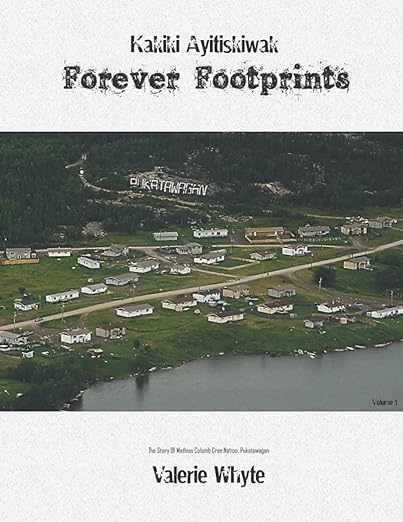 of knowing where you come from and knowing where you belong. Deep inside my soul our ancestors hidden, and silenced memories awoke, spoke, and inspired the true meaning of the genealogy and family tree work and research I do. Human science in native studies nurtures the ancestral blood memory that runs through my veins which sustains and empowers me. There is so much learning in post-secondary education and this is one place where our ancestral teachings come to life and are waiting for you”.
of knowing where you come from and knowing where you belong. Deep inside my soul our ancestors hidden, and silenced memories awoke, spoke, and inspired the true meaning of the genealogy and family tree work and research I do. Human science in native studies nurtures the ancestral blood memory that runs through my veins which sustains and empowers me. There is so much learning in post-secondary education and this is one place where our ancestral teachings come to life and are waiting for you”.
How was your experience in the program?
Setting sights on finishing volume two of a naming book project titled “Forever Footprints” or, “Ayitiskiwak Kakiki,” the Epistemology of our people. Part of the project involves kinship trees, genealogy work sourced from the early eighteenth century. This practice is foundational of our ancestral teachings in knowing where you come from and where you belong. This work is a master’s degree level which is in order for me in the near future.
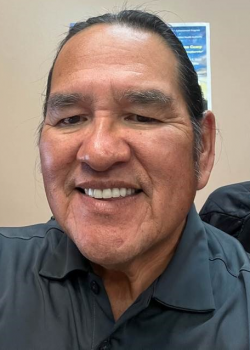 Alvin Michael Merasty, BSW
Alvin Michael Merasty, BSW
“I am 63 winters old and have been married 42 years. We have four children and four grandchildren. My first language is Cree, with the “N” dialect. I also carry a pipe and lead a Sundance ceremony annually,” says Alvin.
Why did you choose this program?
“I chose this program because of the availability and the program being closer to home. I once attended university in Winnipeg in prior years but found that I felt unwelcome. The cohort structure fit my lifestyle as I could earn money as I learned and did university work at the same time without sacrificing any time away from home. This was the key to my success. I was unsure if I really wanted to complete my studies in the fall and winter 2022. That time frame, for me, was so difficult to complete. I relied on my fellow classmates to support and encourage me, and they helped me refocus to complete”.
Do you have a favourite memory in the program?
“My favourite part were the kind instructors. They allowed the students to express themselves without doubt. I was taught how to research topics of my own interest and to respect author integrity. This helps in the social work where I work. One of my favourite highlights was to watch the cohort students become professionals. They learned how to speak, how to present, and how to listen”.
What is next for you?
“In the future, I would like to complete an autobiography, write a warrior war native fiction novel, and to travel the world on a book tour. And finally, maybe complete a master’s program. The University of Manitoba made me feel better about my self and my history. I thank them always”.
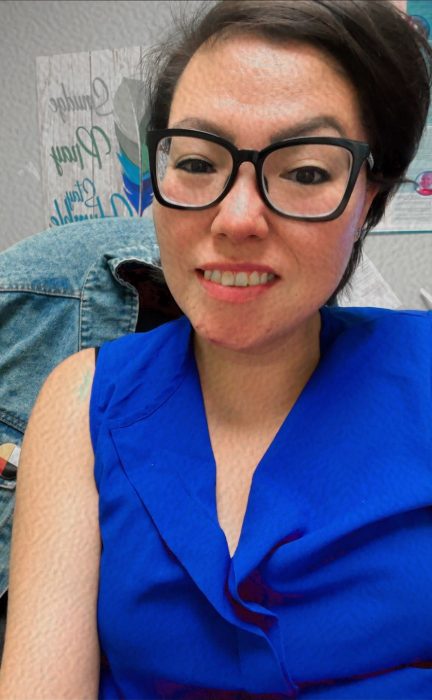 Tracey Chartier, BSW
Tracey Chartier, BSW
Why did you choose this program?
“I began my social work career in the year 2014. I found a biography that I wrote when I was in high school. In my biography, I reflected on how I wanted to be an advocate for the people in my community. My supervisor asked me if I was interested in obtaining my social work degree and I immediately jumped at the opportunity. I learned that the program would take six years which was discouraging at first but I decided to take the opportunity. I was enrolled in a cohort class that included over 30 students. I was intimidated at first because I have not been in school for so many years. We were scheduled to start in 2015. I was super excited but unfortunately, I got sick in September of 2015. I suffered a stroke and was hospitalized for two weeks. I learned that I had a brain bleed and was facing deficits from the stroke. I was unable to read and write which led me to feeling overwhelmed. I was discouraged because this was the year for me to start my education journey,” says Tracey.
“The doctors were concerned that I would not be able to keep up with readings and doing assignments at a university level, but I was very fortunate enough that they suggested an 8-week stay in stroke rehab. The team was amazing and very supportive in my healing journey. I learned to read and write again but I still felt a little discouraged because my reading speed was slow and comprehending what I was reading took time. I managed to get past these feelings and worked with what I could at the time”.
“A year came by and it was time for all of us to start the cohort program, I made the decision to continue with my education journey despite the hardship I would be facing. Most of the class consisted of people who were already in the social work field, which was good because we all had something in common. The plan was to attend class one week out of every month. We all met in a classroom setting that the University College of The North accommodated for us. Some of us traveled from our communities and dedicated those 5 days for in class lectures and evening classes. We did this for almost three years. We were all enrolled in the same courses and formed strong friendships with one another”.
“After completing approximately 50 credit hours, we were encouraged to apply into the Faculty of Social Work at the University of Manitoba. We took courses through distance education. Lots of computer time, and traveling from our communities, and it seemed like never ending readings and papers”.
“Let me tell you, some of those courses are no joke. We were all tested in every way, but we all stuck together. During this time, I reconnected with my culture. I was introduced to ceremony for the very first time. I felt an awakening within me. I truly feel that if I had not been enrolled in this program, I would not have found my identity. I sundanced for the very first time in 2022. I have to say that I found balance in my life which has helped me in so many ways as an individual and someone who wants to be a helper in their community”.
How was your experience in the program?
“The experience was incredible and one of a kind. I am glad that I had this opportunity. I learned a lot about myself and what I want to do for my community. The cohort program took almost seven years but only because it was part time. Our cohort class had supports from the Faculty of Social Work. We had access to the library, to a teacher assistant, and access to tutors that were phenomenal. The instructors went above and beyond for us and in providing accommodations so that each of us could be successful in our studies”.
“It was not easy working full time, going to school part-time and trying to stay committed to our families all at the same time. We all faced struggles and hardships but that did not stop us from succeeding. We all had each other for comfort, love, and support”. “I will never forget the amount of support we had for one another, from our families, from our employers and last but not least, our sponsors”.
Do you have a favourite memory in the program?
“I have so many favorite memories. I will never forget the love and support we all had for one another while on this incredible learning journey. I think we all wanted to quit by the last year because of the years and time that was put in to get our social work degrees. It was truly bittersweet when we obtained our degrees on convocation day”.
What is next for you?
“I would like to continue being a helper in my community but also eventually pursuing a master’s degree in social work”.
Congratulations to all of our graduates!






